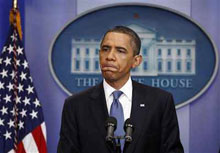Nobody liked it. Not the Tea Party, who complained that the spending cuts in last week’s debt ceiling bill didn’t go nearly far enough. Not the Democrats, who were furious that the agreement didn’t mention new taxes, and that the President had bought into the Right Wing’s program of fiscal austerity. Not the rating agency Standard & Poor’s, which dropped the US’s credit rating from its AAA rating to AA+. Not the US and international markets, which went into tailspins, and still seem spooked and unpredictable.
Especially not the President himself, who announced the settlement with grim determination, a day later trying to lighten the gloom by quipping that even if the job is turning his hair gray, “Michelle still thinks that I’m cute.”
But nobody was laughing.
 Until now, raising the government’s allowable debt – a self-imposed Congressional law dating back to 1917 – had been pretty much pro forma. The limit has been raised scores of times since the passage of the bill, 57 times under Republican administrations, seven times in the last Bush tenure. This time, however, a group of newly-elected Tea Party-endorsed Congressmen dug in their heels and managed to control the entire scenario.
Until now, raising the government’s allowable debt – a self-imposed Congressional law dating back to 1917 – had been pretty much pro forma. The limit has been raised scores of times since the passage of the bill, 57 times under Republican administrations, seven times in the last Bush tenure. This time, however, a group of newly-elected Tea Party-endorsed Congressmen dug in their heels and managed to control the entire scenario.
Supporters of the President were despondent: to them, he had sold the farm from under them. All along he took the moral and political High Road, maintaining that ultimately the Congress would “do the right thing” and extend the limit. At one point ex-President Clinton offered a little-known constitutional clause that Obama could have used to go over Congress’s head, but the President balked; using curiously detached language, he said that his advisers “are not persuaded that this is a winning argument”.
So the bill that nobody liked passed. It was an obvious stopgap measure that would only postpone the pain. Calling for two trillion dollars to be cut from the federal budget in the next ten years, it left the actual decisions about what programs to cut or new taxes to write in the hands of a small Congressional committee that had little hope of coming to a consensus before automatic – and severe – across-the-board cuts would go into effect. It was a bad bill, the world knew it, and the markets went into free fall.
Why the President capitulated – if that’s what he did – remained the question of the day. People argued about it in the subway; newspapers and the Internet were flooded with theories. Some said that the President was “weak,” a “bad negotiator,” “unsure of what he really believes”. Others said that though he was elected to bring about Left-Liberal change, his thinking is much closer to Wall Street than Main Street. Some conceded that the Right has a point: in a few decades the US will be spending more than the entire gross national product. Still others maintained that it was all just politics, a ploy to move the President to the Centre, where the independent voters that he needs to get re-elected are waiting.
The real point was that the President made a serious miscalculation: he tried to reason with unreasonable people. According to all reports, the batch of belligerent Tea Party Congressmen who blocked the negotiations have little interest in traditional politics. They see themselves as on a mission, and don’t count either on being re-elected or becoming part of the Republican machine. To save money, many live in their Congressional offices and order in take-out food. Their thinking is ideological to the core; unsurprisingly, they end up with the same ultimate goal as pure Marxism: to shrink the government down to nothing.
How could Obama have dealt better with these people? Probably only by doing things that don’t come easily to him: By addressing them directly rather than staying aloof. By getting angry in public, and getting the public angry, too. (A New York Times poll found that 82 per cent of the public disapproved of the Congress’s actions.) By making it clear that the Clinton administration had balanced the budget, and that the tax cuts and Iraq War of the Bush years were solely responsible for the continuing deficit: if the Republicans had gotten the country in this mess, it was their job to help get it out. And maybe by doing the unthinkable: by meeting the Right’s stubbornness with his own, and letting the country default.
Would default have started a chain reaction worse than the economic meltdown that the world seems to be inching toward now? As European statesmen pointed out, in a very real sense the damage had already been done. China was in a panic about the declining value of its loans to the US. International markets were plummeting, with countries and institutions taking the paradoxical step of buying US Treasury bills – not because the dollar was a safe haven, but because it was the best of a bad set of alternatives. We’ll never know if the President calling the Right’s bluff and going into default would have been taken as a show of strength or a desperate measure. But the fact that ideology trumped political compromise is very frightening, and one suspects that we’ve only seen the beginning.

 Until now, raising the government’s allowable debt – a self-imposed Congressional law dating back to 1917 – had been pretty much pro forma. The limit has been raised scores of times since the passage of the bill, 57 times under Republican administrations, seven times in the last Bush tenure. This time, however, a group of newly-elected Tea Party-endorsed Congressmen dug in their heels and managed to control the entire scenario.
Until now, raising the government’s allowable debt – a self-imposed Congressional law dating back to 1917 – had been pretty much pro forma. The limit has been raised scores of times since the passage of the bill, 57 times under Republican administrations, seven times in the last Bush tenure. This time, however, a group of newly-elected Tea Party-endorsed Congressmen dug in their heels and managed to control the entire scenario.




